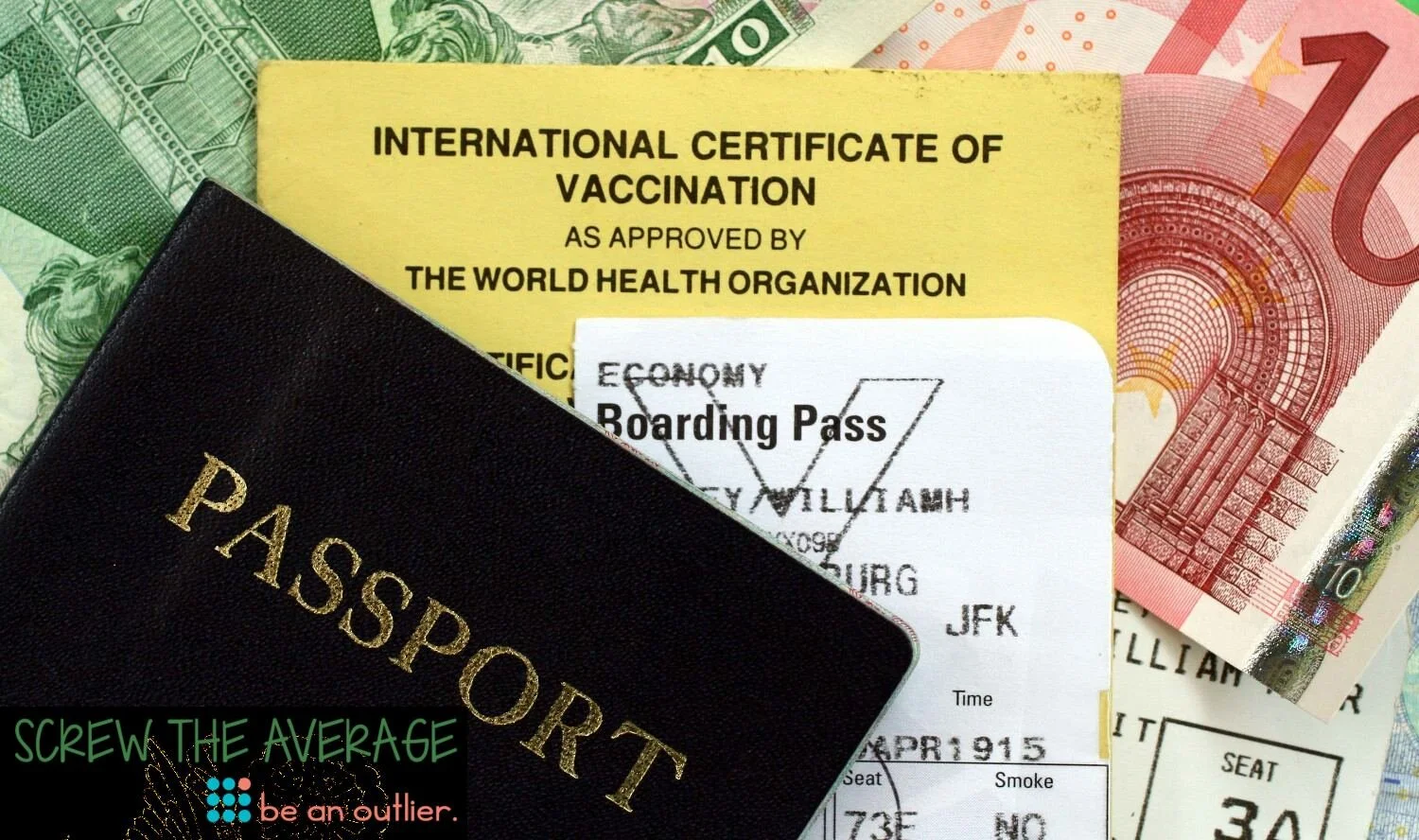Do We Need to Get Travel Vaccinations?
In the long list of things to do before traveling is figuring out if you need travel vaccinations. Depending on the country and even the region within the country you’re traveling to, it may be required to get travel vaccinations, they may be recommended, or not necessary. Read to see our process of figuring what vaccinations we needed and how to get them.
Disclosure: We may receive a commission for links on our blog. You don’t have to use our links, but we’re very appreciative when you do. Thanks again for your support, we hope you find our posts and information helpful!
We’re Traveling Abroad, Do We Need to Get Travel Vaccinations?
We aren't medical experts, talk with your doctor to make sure you get the vaccines that are right for you. Some adults with specific health conditions should not get certain vaccines or should wait to get them.
Being born and raised in the United States, vaccinations beyond childhood vaccines are a pretty unknown subject for us. We know enough to know that we should probably get some additional travel vaccinations before embarking on continuous long-term travel abroad, but that’s it.
“When it comes to international travel, what travel vaccinations do we need? Plus, which vaccines are recommended/optional, and which ones are mandatory?”
When To Start the Travel Vaccination Process
The CDC (Center for Disease Control) recommends starting four to six weeks before traveling. However, we began the travel vaccination process a couple of months before leaving the country.
However, after our experience, we highly recommend that the sooner you can star the travel vaccination process, the better. Here’s why:
You’ll need to figure out which travel vaccinations are required and/or recommended for the places you’ll be visiting.
You’ll need to find a location that administers travel vaccines.
You’ll more than likely need to find a private clinic because travel vaccines aren’t typically covered by US insurance plans.
Availability and prices of vaccines vary by clinic.
Many vaccinations are done in stages and require multiple injections that are spread out over a prescribed timeline.
Travel Vaccinations: Our Experience
We started with our primary care doctor since we wanted a full preventative panel done before we left the country. So, among the many things we discussed with our very patient, helpful, and kind doctor, we also asked about travel vaccinations.
Childhood Vaccinations
The first question she asked, was if we had our childhood vaccines. That was surprisingly a difficult question to answer.
Shannon knew it was very likely that she had everything that was required or suggested by her pediatrician, as she couldn’t imagine her parents opting out of any of them. Shannon also knew that she'd had a tetanus booster shot 3 years ago.
Sergio hadn’t had a tetanus booster shot within the last 10+ years but he thought it was likely that his mother had done all the recommended vaccines for him as well. However, growing up well below the poverty line and uninsured, he couldn’t be sure.
CDC Vaccine Schedule
The CDC publishes up-to-date vaccination schedules for children and adolescents 18 years or younger and one for adults 19 years or older. They also have immunization recommendations for all age groups.
Travel Vaccination Clinics
Ultimately, our physician recommended that we go to a travel clinic.
What a novel idea we thought. Having plenty experience with the American health insurance industry and having heard of many billing nightmares, we called both the travel clinic and our insurance company to verify coverage and cost.
We found out that anything billed to our insurance as travel related wouldn’t be covered.
“Glad to see that our premiums are going to good use (#sarcasm).”
You would think our carrier would prefer to pay for the vaccination over the treatment costs of yellow fever, but apparently not.
So, being the frugal 'go-getters' that we are, we did our own research on travel vaccinations. Confession: Sergio did the research on vaccines and then shared it with Shannon.
First Step: Learn about Vaccinations
There are two kinds of vaccinations…
1. Routine Vaccinations
Routine vaccinations are the ones you generally get as a child and are required to have to attend most schools.
If you were born in a first world country and aren't a child of an anti-vaxxer, then you’ve likely had these vaccinations.
2. Travel Vaccinations
Traveling to other countries exposes your body to viruses that it hasn't been exposed to before. Many countries will recommend or even require that you get one or more specific travel vaccinations before entering the country.
Getting accurate vaccine information is important. Check the World Health Organization’s website to learn more about the specific types of vaccinations.
Vaccinations and Medical Insurance Coverage
Now that we had a good idea about what routine vaccinations and travel vaccinations were, we wanted to know what our insurance company would cover.
We spoke with the travel clinic and got a CPT code (Current Procedural Terminology) for each vaccine, both routine and travel. If you are unfamiliar, CPT codes are the medical diagnostic and billing codes that your medical care provider and insurance company use to bill all procedures and visits.
Once we got all the codes, we called our insurance company and asked the level of coverage for each code. This is a tedious process, but it can prevent an unexpected bill from showing up a month (or several months) later for something you figured was covered.
We found out that our insurance would cover all of the routine vaccinations. This is required under the ACA, so not a surprise.
However, our insurance didn't cover a single one of the travel vaccinations.
Getting Routine Vaccinations
We're grateful that our insurance company covers the cost of routine vaccines because out-of-pocket costs for routine vaccinations are upwards of $2,000 for the first round, plus $800 or more for boosters!
Finding a Clinic to Administer Routine Vaccinations
We decided that we'd go ahead and visit a local clinic to start the vaccination process. To find a clinic that did vaccinations we called our insurance company and customer service was kind enough to give us a few local places that were in-network.
Requesting Routine Vaccinations as Adults
When we arrived at the clinic and we spoke to the receptionist. She was a bit confused by our request for routine vaccinations. Since we were adults, we weren’t the typical patient for these types of vaccines.
We explained the situation to her and she was kind enough to speak with the nurse, who after a series of detailed questions came out to speak with us directly. The nurse informed us that there was no harm in getting all of the routine vaccinations, even if we'd had them as children.
While he didn’t think it was necessary since we'd likely already received them, he said it would be fine to do it anyway. After 10 minutes of discussion and questions, Sergio opted to get all routine vaccinations, including Tdap (Tetanus and Diphtheria Toxoid). Shannon did all routine vaccinations except for Tdap (she’d had hers a couple of years prior).
Getting Vaccine Shots
All the vaccinations we got were shots in our arms, either in the fatty tissue or the muscle.
Thankfully, neither Sergio nor I are afraid of needles and had no problem getting the shots.
The nurse was kind enough to split the shots between our left and right arms. We both thought they stung a bit going in, but was nothing to really worry about. Afterwards, Shannon’s arms were sore for a few hours, while Sergio felt like he’d been slapped with a bat and was sore for days.
Vaccination Follow-Up and Vaccine Boosters
One of the main reasons that it’s recommended you get vaccinated four to six weeks before traveling is because many vaccinations require boosters. That means that in a set period of time you'll need to get a second (or third) shot.
“After our first set of routine vaccinations, we’ll need to go back in 30, and 180 days for a set of follow-up (booster) shots.”
Tuberculosis (TB) Vaccination
Tuberculosis (TB) vaccination is usually considered a routine vaccination. However, while this vaccine is given in other countries as a preventative measure, it’s not administered in the United States. It seems a bit backward to us, but the process/handling of TB in the US is as such:
You can be tested for TB with a skin test.
If the test comes back positive for TB, they will do an X-ray of the lungs to determine if you have an active infection of TB and follow it with treatment as needed.
If the test comes back negative for TB, there's no further steps you can take, at least not in the US.
Travel Vaccinations
Know Where You’re Traveling
Since we’re traveling the opportunity, not the destination, we’re not sure exactly what countries or regions we’ll be visiting over the next year. This becomes challenging, because the only way of knowing what vaccines you’ll need, is to know what countries you’ll be in.
For our situation, we went at the problem backwards. Where most people look up what travel vaccinations are needed for the country they’re visiting, we looked up what countries/regions needed vaccines. From there, we determined the likelihood of us visiting those places.
“What we realized is that many of the countries and regions we think we’ll visit don’t require or even recommend travel vaccinations for visitors. ”
On the other hand, since we’re traveling without a predetermined itinerary or even list of destinations, there’s a good chance we’ll decide to travel to a country or region that recommends or requires specific vaccinations.
CDC Travel Vaccination Information for Travelers
The CDC has a great tool to find out what travel vaccinations are recommended based on your medical condition and destination(s). They also publish travel health notices and updates on current travel health warnings, like Zika virus and yellow fever.
Cost of Travel Vaccinations
Our health insurance won’t cover travel vaccinations (or anything coded as ‘travel’ for that matter).
Since we’d be paying out of pocket for any travel related vaccines (like yellow fever, typhoid fever and Japanese encephalitis), we decided it was appropriate to find out how much they’d cost.
“After doing research and calling several travel vaccinationsclinics we learned that travel vaccine prices ranged from $300-$600 for each vaccine injection.”
Because of the high price tags and the uncertainty of exactly which vaccines we may need, we started to consider alternatives.
Cost of Travel Vaccinations Abroad
We scoured relevant blogs and forums to see what the consensus was on the cost of travel vaccinations in the United States versus Europe. (Confession: Sergio did the research). What we learned is that if you're a resident of one of many European countries, travel vaccines are generally free.
We attempted to find the cost for visitors, but had trouble finding reliable information. However, we think they’re likely to be significantly less expensive if we purchase and have them administered in Europe.
Because we don’t need any of the travel vaccinations while in the large, heavily populated locations of Europe, we’ve opted to wait on getting our travel vaccinations while still in the United States. Once we get to Europe we plan asking local travel vaccine clinics what the out-of-pocket costs are there.
Curious what it’s like to get sick abroad? Not only did we wonder what it was like, and how to get medical attention, we experienced it. Check out what it was like to get sick in the United Kingdom and in Athens as foreign visitors.
Proof of Vaccination for Entry Visas
When planning your travel vaccination schedule, it’s also important to keep in mind that some countries require specific vaccinations for entry. Often times, to be approved for an entry visa to the country, you’ll need proof of having had the vaccine.
To find what countries require and/or recommend vaccinations, here are a couple of resources we found helpful:
Final Thoughts
Being prepared for travel, especially when it comes to our health is especially important! We’re glad to have up-to-date routine vaccinations and grateful that these were covered by our medical insurance.
On the other hand, it’s incredibly disappointing that more vaccines, including travel vaccines, aren’t considered preventative care. Or at the very least covered at least partially (with a co-payment, after deductible, or with a split cost).
We highly recommend reading up on vaccines, so here are additional resources for travel vaccinations:










